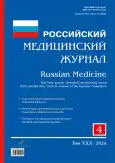Clinical manifestations of scarlet fever in children in the megalopolis at the present stage
- 作者: Briko N.I.1, Nikitin N.V.1, Glushkova E.V.1, Kodalaeva M.V.1, Shaova K.T.1, Mazankova L.N.2, Korsunskiy A.A.1,3
-
隶属关系:
- I.M. Sechenov First Moscow State Medical University
- Russian Medical Academy of Continuous Professional Education
- Children’s City Clinical Hospital No. 9 named after G.N. Speransky
- 期: 卷 30, 编号 4 (2024)
- 页面: 336-347
- 栏目: Original Research Articles
- URL: https://bakhtiniada.ru/0869-2106/article/view/265179
- DOI: https://doi.org/10.17816/medjrf630935
- ID: 265179
如何引用文章
详细
BACKGROUND: According to the literature, an increase in severe forms of scarlet fever among children was noted in several countries in 2022–2023.
AIM: To identify the current clinical features of scarlet fever in children in a large metropolis in Russia.
MATERIALS AND METHODS: An observational descriptive retrospective continuous study of the clinical features of the course of scarlet fever in children was conducted based on patient case histories from 2020 to 2022.
Statistical processing was performed using methods for calculating extensive and intensive indicators (p1 and p2), errors of extensive indicators (m1 and m2), and standard deviations (pmax↔ pmin), considering the confidence interval (t) and confidence probability (P=95%).
The percentages were compared using Fisher’s exact criterion. The differences were considered significant at p <0.05.
RESULTS: The abolition of anti-epidemic restrictions on COVID-19 in 2022 led to an increase in the incidence of scarlet fever among children aged 0–18 years by 3.6 times compared to that in 2021 and to an increase in hospitalization in hospitals in Moscow. The number of hospitalized children with scarlet fever in 2022 increased by 18.0 times compared to that in 2020. Majority of those hospitalized (83.4%) were children of preschool and school age, including those aged 3–7 years (52.9%) and 7–15 years (39.3%), with an average severity of the disease of 93.6%.
Among the examined children, 53 (18.0%) had a history of COVID-19, and among this group of children, one in 5th had severe scarlet fever.
Every 8th–9th patient (12.2%) had various complications, mainly of a septic nature, that occurred at week 1 of the disease; at week 2 and later, complications of infectious and allergic nature were observed.
Antibiotics of the cephalosporin (53.6%) and penicillin (46.4%) series were used to treat scarlet fever.
CONCLUSION: In modern conditions of the megalopolis, scarlet fever occurs with typical clinical characteristics. In most children, scarlet fever was characterized by a moderate course, and various complications were identified in 12.2% of children. It was noted that against the background of an increase in the number of hospitalized patients, the number of patients with severe scarlet fever decreases and the incidence of complications does not change (12.3–12.8%). Scarlet fever is 8.3 times more likely to occur in severe form in patients who have had COVID-19 than in those who did not have a history of COVID-19.
作者简介
Nikolay Briko
I.M. Sechenov First Moscow State Medical University
Email: nbrico@mail.ru
ORCID iD: 0000-0002-6446-2744
SPIN 代码: 2992-6915
MD, Dr. Sci. (Medicine), Professor, Academician of the Russian Academy of Sciences
俄罗斯联邦, MoscowNikita Nikitin
I.M. Sechenov First Moscow State Medical University
编辑信件的主要联系方式.
Email: nekel358@gmail.com
ORCID iD: 0000-0003-2003-4171
SPIN 代码: 3479-8217
俄罗斯联邦, Moscow
Ekaterina Glushkova
I.M. Sechenov First Moscow State Medical University
Email: ekaterina-1801@mail.ru
ORCID iD: 0000-0001-6997-7598
SPIN 代码: 2336-3176
MD, Cand. Sci. (Medicine), Associate Professor
俄罗斯联邦, MoscowMarina Kodalaeva
I.M. Sechenov First Moscow State Medical University
Email: marinacb66@mail.ru
ORCID iD: 0009-0003-6626-6485
SPIN 代码: 3422-4182
俄罗斯联邦, Moscow
Karina Shaova
I.M. Sechenov First Moscow State Medical University
Email: twilight006@mail.ru
ORCID iD: 0009-0000-1947-0393
俄罗斯联邦, Moscow
Lyudmila Mazankova
Russian Medical Academy of Continuous Professional Education
Email: mazankova@list.ru
ORCID iD: 0000-0002-0895-6707
SPIN 代码: 4935-7011
MD, Dr. Sci. (Medicine), Professor
俄罗斯联邦, MoscowAnatoliy Korsunskiy
I.M. Sechenov First Moscow State Medical University; Children’s City Clinical Hospital No. 9 named after G.N. Speransky
Email: korsunskiy_a_a@staff.sechenov.ru
ORCID iD: 0000-0002-9087-1656
SPIN 代码: 6374-0484
MD, Dr. Sci. (Medicine), Professor
俄罗斯联邦, Moscow; Moscow参考
- Increase in invasive Group A streptococcal infections among children in Europe, including fatalities. In: World Health Organization [Internet]. Geneva: World Health Organization; 2022 [cited 2024 May 28]. Available from: https://www.who.int/europe/news/item/12-12-2022-increase-in-invasive-group-a-streptococcal-infections-among-children-in-europe--including-fatalities
- de Ceano-Vivas M, Molina Gutiérrez MÁ, Mellado-Sola I, et al. Streptococcus pyogenes infections in Spanish children before and after the COVID pandemic. Coming back to the previous incidence. Enferm Infecc Microbiol Clin (Engl Ed). 2024;42(2):88–92. doi: 10.1016/j.eimce.2023.04.021
- Hussain Z. Scarlet fever infections rise to nearly 30 000, UKHSA reports. BMJ. 2022;23(379):3059. doi: 10.1136/bmj.o3059
- Glushkova EV, Brazhnikov AYu, Krasnova SV, et al. Clinical and epidemiological characteristics of scarlet fever in Russia. Epidemiology and Vaccinal Prevention. 2023;22(3):14–25. EDN: MROGBQ doi: 10.31631/2073-3046-2023-22-3-14-25
- Iskova IA, Kliaritskaia IL, Tsapyak TA, Krivoy VV. Group A streptococcal infection: its significance and diagnosis. Crimean Journal of Internal Diseases. 2021;(1):32–36. EDN: HVKKEC
- Matsubara VH, Christoforou J, Samaranayake L. Recrudescence of scarlet fever and its implications for dental professionals. Int Dent J. 2023;73(3):331–336. doi: 10.1016/j.identj.2023.03.009
- Timchenko VN, Pavlova EB, Pavlova NV, Sertakova ZL. Features of the clinic and treatment of modern scarlet fever. Detskie infekcii. 2004;(3):71–73. (In Russ.) EDN: KAPRVB
- Ilunina LM, Kokoreva SP, Stahurlova SE, Klemjatina EJu. Clinical characteristics of modern scarlet fever in children hospitalized in a hospital. Applied and IT Research in Medicine. 2017;20(3):128–132. (In Russ.) EDN: ZCQDYJ
- Pavlova NV, Pavlova EB. Clinical and epidemiological characteristics of scarlet fever in children in St. Petersburg (2003–2009). The Scientific Notes of the Pavlov University. 2011;(2):18–20. (In Russ.) EDN: SNMSBR
- Levanovich VV, Timchenko VN, editors. Evolution of streptococcal infection: a guide for doctors. Saint Petersburg: SpetsLit; 2015. 495 p. (In Russ.)
- Gashina EA, Joidik SN, Golovanova NV. Features of scarlet fever in children and experience of application of streptatest system. Vestnik SurGU. Meditsina. 2020;(4):46–50. (In Russ.) EDN: OCFEQZ doi: 10.34822/2304-9448-2020-4-46-50
- Ivanova ON. Post-COVID syndrome in children. International Research Journal. 2021;(9-2):35–39. EDN: SFNKUA doi: 10.23670/IRJ.2021.9.111.040
- Pokrovskij VI, Briko NI, Rjapis LA. Streptococci and streptococcosis. Moscow: GEOTAR-Media; 2006. (In Russ.)
- Novosad EV, editor. Scarlatina in children. Textbook. Moscow: RNIMU named after. N.I. Pirogov; 2020. (In Russ.)
补充文件














